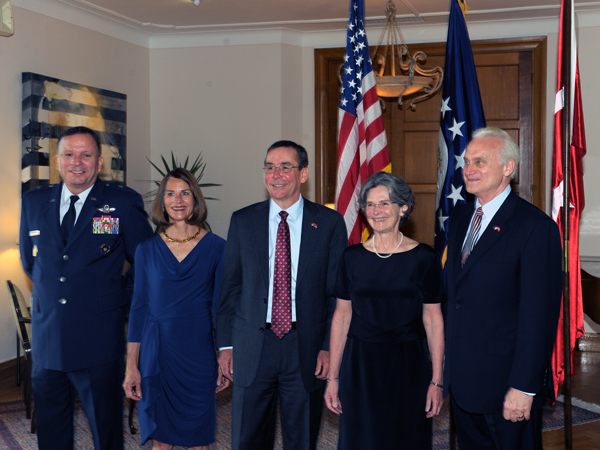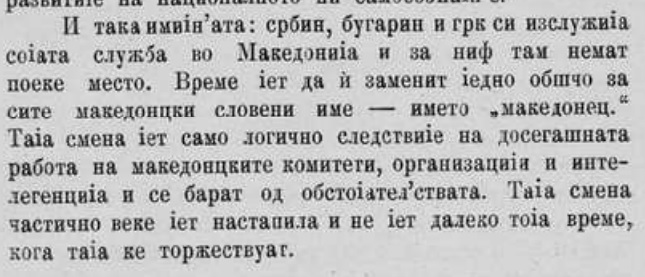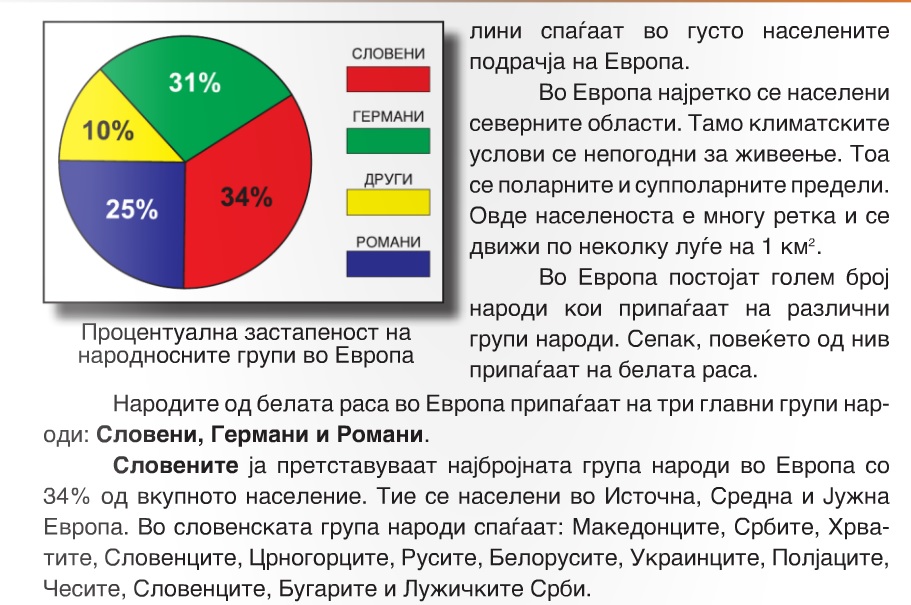Critical Thinking Exercises: Is the Word “Slavs” Offensive to Macedonians?
Published in Analyses
on 6 - 11 - 2014 Author: Жарко Трајаноски
- Future US ambassador to Macedonia, Jess Baily (in the middle) at the Independence Day celebration in the US Consulate in Adana, Turkey, where he served as deputy chief of mission. (With the U.S. Ambassador to Turkey, F. J. Ricciardone, and spouses). Photo: U.S. Department of State, 2013
The recent media smear campaign, accompanied with hate speech against the newly appointed American ambassador can serve as good basis for an exercise in posing critical questions.
Written by: Zharko Trajanoski, MA in Human Rights
1) Does the use of the term “Slavs” means “negation of the existence of the Macedonian people”?
The media witch hunt started after the following report by the MIA correspondent from Brussels:
“There are Slav majority and Albanian minority living in Macedonia. With this negation of the existence of the Macedonian nation, the new American ambassador Jess Lippincott Baily comes to service in the Republic of Macedonia, MIA reports from Brussels. (Baily: In Macedonia live majority Slavs and majorty Albanians; [en])
The media smear campaign progressed to the level that some pro-government “experts” came to the following conclusion:
“Allow us to remind you that, in the Senate, where by tradition the new ambassadors have “hearings,” Baley said that here [in Macedonia] live “Slavs, Albanians and others…” therefore to conclude in short and clear – there are no Macedonians!”
If the journalists, before reporting on this, made an elementary fact-checking from the ambassador’s statement, they would have had the opportunity to pose the following critical questions:
- Does the use of the constitutional name Republic of Macedonia, its short version Macedonia (for the state), as the use of the terms “Macedonians,” “Macedonian press,” “ethnic Albanian and Macedonian populations,” represent a “negation of the existence of the Macedonian people”?
- If the statement: “…” is a “dangerous thesis,” isn’t it as “dangerous” as the definition of the term “Macedonians” in the “Macedonian Encyclopedia” as a “Slavic people in ethnic, cultural and national sense, which lives in R.M., on the territory of ethnic Macedonia and in the diaspora”? (Macedonian Encyclopedia, published by the Macedonian Academy of Arts and Sciences in 2006, page 894)
- Why certain journalists and politicians felt “offended” by the use of the term “Slavs,” when in the textbooks published by the Macedonian state the children can read that the Macedonians belong to the Slavic group of peoples? (For instance, in the textbook for Geography for 7th grade of primary school.)
Preceeding examples show that the use of the term “Slavs” does not exclude, nor negates, the use of the terms “Macedonians” in ethnic sense. Therefore, why did the media smear campaign against the newly appointed American ambassador take place?
2. Why it is not offensive when Macedonian politicians call us “Slavs”?
Indeed, why the media turned into a scandal the use of the term “Slavs” by the American ambassador, but are not scandalized when Macedonian politicians refer to ethnic Macedonians as Slavs?
- Why the media did not start a campaign against the President of the Assembly who stressed that thanks to the All-Slavic Educators [literal term used in Macedonia for the Saints Cyril and Methodius, otherwise known by the title “Apostles to the Slavs”] “Macedonian people received opportunity to spread Christian values in its own language that it can understand…”?
- Why the media did not represent as an insult or shame the congratulation by the Prime Minister of the “Day of the Macedonian and All-Slavic Educators, the holy brothers Cyril and Methodius,” or his pride over the “first Slavic university” of St. Clement of Ohrid?
- Why the media failed to represent as scandalous the controversial quoting by the President of the Republic of the book “Kingdom of the Slavs” ((Photo) Ivanov in Moscow: The Russians Had the Same Language as Ancient Macedonians), whose author defined the Macedonians as Slavs?
3. Noncritical reporting about the reaction by Ministry of Foreign Affairs
Most of the Macedonian media just transmitted the reaction by the Ministry of Foreign Affairs (MFA) that “Such naming brings into question the identity and hurts the feelings of the Macedonian people.” (for instance: MFA with Protest Note to the U.S.A.: We are Not Slavs).
The journalists failed to ask the following critical questions:
- How is it possible to bring into question the identity of the Macedonian people by an ambassador who uses the constitutional name and the terms “Macedonia,” “Macedonians,” “ethnic Macedonian population,” in parallel with the term “Slavs”??
- How come the MFA had no similar reaction towards the latest EC report, which does not mention constitutional name, nor the Macedonian language, nor the ethnic identity “Macedonians”?
- Why the media did not create a scandal when the president of the state received such a report and “expressed pleasure from the confirmed recommendation,” and failed to fulfil his promise from 2011 that “in the future I will not accept a report which does not show respect for the Macedonian language and identity”?
4. Historical and media embarrassments
Instead of scandalizing and public incitement of a sense of shame due to the use of the term “Slavs,” the journalists would have behaved ethically if they leafed through, for instance, the “Macedonian Encyclopedia” and reported to the public about how many times and in which contexts the term “Slavs” had been used. Even a superficial search of the “Macedonian Encyclopedia” could incite them to pose the following critical questions:
- Should we be ashamed of the members of the Young Macedonian Literary Association “Loza,” who popularized the name “Macedonians” as a name of a Slavic element?
- Should the citizens of Bitola, Prilep, Veles… be ashamed of the Slavic names of their cities?
- Is there anything shameful in the fact that the “Macedonian League,” founded in 1880 considered itself as “the only legitimate representative of the Slavic majority of the population in Macedonia”?
- Should we be offended by the titles of the books by Angel Dinev from the village of Smokvica, “The Macedonian Slavs” (1938) and “The Ethnographic Idea of the Macedonian Slavs” (1944)?
- Should we feel ashamed of Grigor Prlichev, who wanted to create a grammar of a Slavic Esperanto?

- Excerpt from “On Macedonian Matters” (1903) by Krste Petkov Misirkov: “Thus the terms Serb, Bulgarian, and Greek have served their time in Macedonia and there is no longer any place for them. It is time for them to be changed for a name common to all Macedonian Slavs, the name Macedonian. This exchange is simply the logical outcome of the work of the Macedonian Committees, the Organization, and the intelligentsia, and it is conditioned by new circumstances. This exchange has already been partially affected and the time is not far off when it will celebrate its full success.”
- At last, should we be ashamed of Krste Petkov-Misirkov, who in the book “On Macedonian Matters,” wrote about the “the most powerful Macedonian nationality – the Slavs” and advocated for “a name common to all Macedonian Slavs, the name Macedonian”?
- Why did the most prominent figures of the Macedonian enlightenment proudly claim they are Macedonians and Slavs, while our contemporary “enlighteners” are scandalized by the term “Slavs”?
This analysis was created within the framework of the USAID Media Strengthening in Macedonia Project – Media Fact-Checking Service Component, implemented by Metamorphosis. The analysis is made possible by the generous support of the American people through the United States Agency for International Development (USAID). The contents are the responsibility of its author and do not necessarily reflect the views of Metamorphosis, USAID or the United States Government. For more information on the work of USAID in Macedonia please visit its website (macedonia.usaid.gov) and Facebook page (www.facebook.com/USAIDMacedonia).


